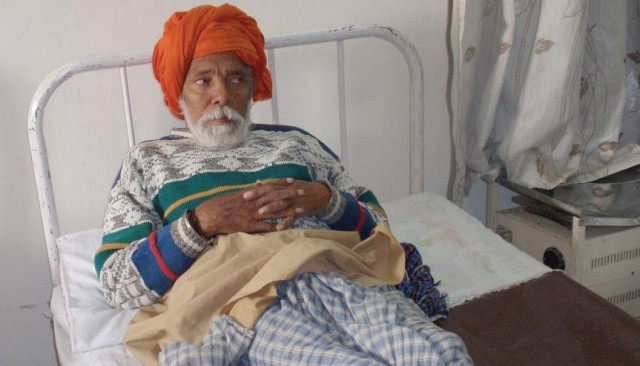Severing ties: 15 men put their soldiers to bed, undergo vasectomies
Some of them had never heard of contraception.

The Khairpur resident, and 15 others were about to undergo a vasectomy at the Reproductive Health Services Centre in Sukkur on Saturday. It took Ali Raza Talpur, who works for the family welfare department recruiting men to the cause, an entire year to convince Shah.
Shah, now retired, used to work as a labourer. He is the father of three, his eldest son is 34 years old while his daughter is 11.
Shah has been married about 45 years but it took 11 years for the couple to conceive their first child.
“My daughter is eleven years old and there is a long pause between the two children’s births,” he told The Express Tribune. When asked what form of contraception he used, Shah laughed and put the long gap down to nature. “I knew nothing about family planning till I met Ali Raza a year ago,” he grinned sheepishly.
Forty-four-year-old Neno Ram was as oblivious as Shah when it came to birth control. The Reti resident works as a radio mechanic and has eight children. “Mohammad Ali Chachar (of the family planning department) told me about this operation,” he told The Express Tribune as he waited his turn. “I have five daughters and three sons. I wish somebody had told me about this earlier.”
He explained that a vasectomy suited him better than traditional contraceptive methods as he could not afford to spend money on condoms, oral pills or injections. “The doctor told me that it is a very minor operation and will take five to seven minutes,” he said. “At first I was afraid, but after seeing this old man (Shah), just undergo the operation, I am not scared anymore.”
Chachar also talked Sadho Jee into undergoing the operation. The 40-year-old Reti resident runs a grocery shop and has six children. Unlike the other two, birth control was not a new concept to Sadho Jee and the rest of his village. He used to use condoms but stopped when his wife contracted an infection. His wife then started on the pill, but often forgot to take her daily dose. “Many people in our village have undergone the operation and therefore I decided to as well,” he explained.
Ameer Bux Rid, Abdul Rasheed and the rest of the men there for the procedure were all looking to prevent their families from growing and straining their already limited funds.
Dr Ghulam Shabbir Sadhayo, who operated on the 15 men, explained that the procedure is a No Scalpel Vasectomy (NSV), which means that no sharp knife or instrument is used during the operation. A very little hole is made in the testis to block a tube carrying sperm into the semen. The area is anesthetised locally and the process takes five to seven minutes. Except for a little pain that fades after a week of medication, there are no after-affects. Men can go back to work within half an hour.
Women can undergo a tubulisation - a permanent method that has no after-effects. It involves a two centimetre incision just below the navel to cut off the fallopian tubes responsible for carrying ovum to the uterus.
Men like Talpur and Chachar have the tough job of convincing unlettered men in rural areas to consider contraception. Talpur used to meet villagers at a roadside hotel at the autak of an elder to tell them of the benefits of a vasectomy. “Once a man stood up and tried to attack me, saying that I wanted to deprive him of his manhood,” he told The Express Tribune, laughing. People like Sher Mohammad Shah are very hard nuts to crack because they need dozens of assurances before they agree to go through with it. They are always most concerned about the procedure affecting their married life, explained Talpur. But this is not the case.
Published in The Express Tribune, November 29th, 2011.



















COMMENTS
Comments are moderated and generally will be posted if they are on-topic and not abusive.
For more information, please see our Comments FAQ